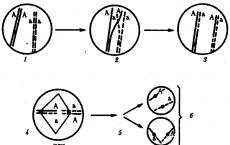3 declension dative case ending and examples. Cases of nouns. Cases are divided into direct and indirect
In Russian everything six independent cases, and decline (change in cases) nouns, adjectives, numerals and pronouns. But schoolchildren often have difficulties in determining the case. Students are not always able to correctly put the question to the word, and this leads to errors. Particular difficulties arise when the word in different cases has the same form.
There are several tricks that will help you accurately determine the case of a word.
1. Statement of the question.
Let us note that the question should be case, not semantic. For questions where? where? when? why? it is not possible to determine the fall.
Both applicants(who? – R. p.).
What happened in 1812?(in what? – P. p.).
After the concert five(I. p.) spectators(whom? – R. p.) stayed in the hall(in what? – P. p.).
In ten minutes(through what? – V. p.) he (I. p.) returned.
She is happy with the new car(how? – T. p.).
2. Exist auxiliary words, which can help in determining the case:
|
case |
Auxiliary word |
case question |
|
Nominative |
||
|
Genitive |
whom? what? |
|
|
Dative |
to whom? what? |
|
|
Accusative |
whom? what? |
|
|
Instrumental |
||
|
Prepositional |
talk |
about whom? about what? |

To distinguish between homonymous case forms, the following techniques are used.
3. Replacing the singular with the plural.
To go on the road(ending -e both in D. p., and in P. p.).
Walk the roads(why? – D. p., in P. p. – about roads).
4. Replacing the masculine gender with the feminine.
met a friend(ending -a both in R. p., and in V. p.).
Met a girlfriend(whom? – V. p., in R. p. – girlfriends).
5. Magic word mom.
Particular difficulties arise when distinguishing between the forms of accusative and genitive, accusative and nominative cases. Help, as always, will come "mum". It is this word that can be substituted in a sentence. Framed, look at the end: mom BUT – nominative, mom S – Genitive; mom At – accusative.
Die yourself, and comrade(ending -a both in R. p., and in V. p.) help out.
Die yourself, but mom(V. p.) help out.
6. Knowing the characteristic prepositions also helps to determine the case.
|
case |
Prepositions |
|
Nominative |
|
|
Genitive |
without, at, from, to, with, from, near |
|
Dative |
|
|
Accusative |
on, for, under, through, in, about, |
|
Instrumental |
over, behind, under, with, in front of, between |
|
Prepositional |
in, oh, about, on, at |
As you can see, there are prepositions that are characteristic of only one case: without– for the genitive (no hitch); by, to – for the dative case (through the forest, towards the house), oh, oh, at – for prepositional case (about three heads, with you).
Recall that the case of an adjective is determined by the case of the word being defined. In order to determine the case of an adjective, it is necessary to find in the sentence the noun to which it refers, because the adjective is always in the same case as the word being defined.
I'm happy with my new coat. Adjective new refers to a noun coat in T. p., therefore, new – T. p.
Do you have any questions? Don't know how to define case?
To get the help of a tutor - register.
The first lesson is free!
site, with full or partial copying of the material, a link to the source is required.
IN different countries world there are different languages. There are different methods for people to understand a particular language. For example, in Russian - there are cases. In other languages that do not have this concept, there are different arrangements of words, prepositions and other methods of linking words into sentences and endowing them with meaning. In our native language there are such cases as instrumental, nominative, dative, prepositional, genitive and accusative. A change in the case of any speech part is called its declension, which is expressed in the end of the word.
Questions of the dative case.
Let's take a closer look at the dative case. The dative case answers the questions "To whom?", "For what?", in addition to these questions, such a word as "give" appears.
For example, give "To whom?", "What" - to a person, a ladder.
"TO blackboard disciple Ivanov was called to answer. The noun "board" in this sentence is in the dative case and in the singular.
"To school boards special chalk was attached. In this example, the same noun is in the dative case, but in the plural.
Endings and prepositions of the dative case.
Let's talk about endings next. As mentioned above, when changing the case, any word changes its ending. In the dative case, the nouns of the first declension will have the ending "E" (wall, board), the second declension - the ending "U" (log, air conditioner) and the third declension will get the ending "I" (dirt).
For a beautiful bunch of words in a sentence, prepositions are used. With nouns in the dative case, the prepositions "K" and "Po" are used.
« Over the bridge a man was walking, enjoying the magical beauty of the river”, “ TO another date We started preparing events.
To connect with other words, nouns change in cases.
There are six cases in Russian, each case answers a specific question:
All cases except the nominative are called indirect. The nominative case is called direct. Nominatives in the nominative case are subjects in the sentence, and in oblique cases they are secondary members.
To find out the case of a noun, you need to find the word on which it depends, and put a question to the noun from this word.
Prepositions of cases in Russian
Together with case endings, prepositions are used to connect nouns with other words. The prepositional case is used only with prepositions, for example:
talked about the house, lives in the house
The remaining indirect cases are used both with prepositions and without them, for example:
no forest, stopped by the forest- Genitive
give mom, go to mom- dative
The nominative case is always used without prepositions.
Genitive prepositions
Prepositions used with nouns in the genitive case:
from, from, to, from, with, without, about, around, for.
Noun in genitive case with word No denotes the absence of an object: no (what?) tea, no (who?) elephant.
Nouns in the genitive case are often used with prepositions from, from, from, to designate a place, and answer questions where? where?:
(where?) by the lake, (from where?) from the closet.
Genitive nouns often refer to the person or thing to which something belongs, for example:
holiday (of whom?) Sisters, the door (of what?) of the closet.
Dative prepositions
Prepositions used with nouns in the dative case
to, by.
The noun in the dative case denotes the object for which the action is performed:
told (to whom?) a friend, returned (to whom?) mother.
A noun in the dative case is often used with a preposition to to indicate the object to which the action is directed:
goes (where? or to what?) to the sea.
Accusative prepositions
Prepositions used with nouns in the accusative case:
in, on, behind, under, through.
The noun in the accusative case is a minor member of the sentence and most often denotes the subject on which the action passes. With prepositions in And on the indicates where the action is directed. These nouns can be questioned where? For example:
went (where? into what?) to class
came (where? for what?) to the kitchen
Instrumental prepositions
Prepositions used with nouns in the instrumental case:
behind, on, under, before, with.
The noun in the instrumental case is a minor member and denotes the object (tool) with which the action is performed. They are often used with prepositions above And under to indicate a place and answer a question where? For example:
flies (where?) over the ocean
hangs (where?) under a tree
Prepositions of the prepositional case
Nouns in the prepositional case are always used with prepositions (never used without prepositions). Prepositions used with nouns in the prepositional case:
oh, about, in, in, on, at.
Noun in the prepositional case with a preposition about denotes a person or thing about which something is said:
said (about whom?) about mom.
told (about what?) about a dream.
noun with preposition on the or in stands in the prepositional case if it indicates the place of action and answers the question where? If a noun with a preposition on the or in indicates the place of direction of action and answers the question where?, then it is in the accusative case:
walks (where?) in the park- prepositional
goes (where?) to the park- accusative
Dative is one of the indirect cases. The dative occupies a special place among the Russian cases. The dative is opposed to the so-called syntactic cases - nominative, accusative and genitive (which in their original function are simply indicators of the dependence of the name on the control word) - in that it has its own semantics. The most characteristic meanings of the dative are the meanings of the Recipient (Recipient), cf. give a child a candy, addressee, cf. tell the children a story, Benefaktiva ("beneficiary"), cf. help brother with homework.
Nouns in the dative case answer questions - To whom? What? and combined with prepositions to, by.
In Russian, the dative form can also express experimenter(subject of perception, emotional and mental state). The experiential dative has a special syntactic behavior, namely, it reveals some properties of the subject.
Nouns in the dative case, examples: give daughters, walk along field, children fun, kitten half a year, glory, get closer to goals, buy by road.
How to determine the dative case?
To determine the dative case of a noun, put the appropriate case questions to the word ( To whom? What?) and select its case ending. The endings of nouns of different declensions in D. p. are presented in the table.
| declination | Unit number | Mn. number | ||
| 1 declination | -e, -and | Outskirts e, zor e, comedy And, son e, dream e | -am (-yam) | Outskirts am, zor pits, comedy pits little son am, dream pits |
| 2 declension | -y (-y) | Thunder at, locksmith Yu, heart at, floor Yu | Thunder am, locksmith pits, heart am, floor pits | |
| 3 declension | -And | Mouse And, gran And | Mouse am, gran pits | |
| Differing | -And | child And, put And, tribes And | Det pits, put pits, tribes am | |
Note! Proper nouns Love, Maria, Julia in the dative case they have the ending " -And» – Love, Mary, Julia.
Meaning of the dative case
In phrases and sentences, the forms of nouns in the dative case can express different meanings:
- Subjective (used in impersonal phrases): the student does not think, the woman is sad, the car is four years old.
- Objective (used in the meaning of the addressee or indirect object): give to a friend, entrust a courier, advice to daughters, letters to colleagues.
- Object circumstantial: walk along the road, head to the castle, go to the crossroads.
- Definitive: monument to Griboedov, the price of words.
To whom? What? - these questions are typical for nouns in the dative case. It is noteworthy that in Russian the dative case can be used not only with nouns, but with verbs. In this article, you can find out what the meaning of the dative case is, get acquainted with the methods of its definition.
What is the dative case?
Dative case in Russian- indirect case, expressing in speech the attributive, subjective, object and object-adverbial meanings. The dative case can be adjectival (used with nouns) and verbal (used with verbs). Nouns in the dative case answer questions – To whom? What? and combined with suggestions to, by.
Nouns in the dative case, examples: give daughters, walk along field, children fun, kitten half a year, glory, get closer to goals, buy by road.
How to determine the dative case?
To determine the dative case of a noun, put the appropriate case questions to the word ( To whom? What?) and select its case ending. The endings of nouns of different declensions in D. p. are presented in the table.
| declination | Unit number | Mn. number | ||
| 1 declination | -e, -and | Outskirts e, zor e, comedy And, son e, dream e | -am (-yam) | Outskirts am, zor pits, comedy pits little son am, dream pits |
| 2 declension | -y (-y) | Thunder at, locksmith Yu, heart at, floor Yu | Thunder am, locksmith pits, heart am, floor pits | |
| 3 declension | -And | Mouse And, gran And | Mouse am, gran pits | |
| Differing | -And | child And, put And, tribes And | Det pits, put pits, tribes am | |
Note! Proper nouns Love, Maria, Julia in the dative case they have the ending " -And» – Love, Mary, Julia.
Meaning of the dative case
In phrases and sentences, the forms of nouns in the dative case can express different meanings:
- Subjective (used in impersonal phrases): the student does not think, the woman is sad, the car is four years old.
- Objective (used in the meaning of the addressee or indirect object): give to a friend, entrust a courier, advice to daughters, letters to colleagues.
- Object circumstantial: walk along the road, head to the castle, go to the crossroads.
- Definitive: monument to Griboedov, the price of words.



